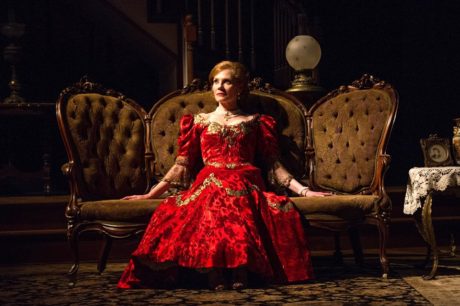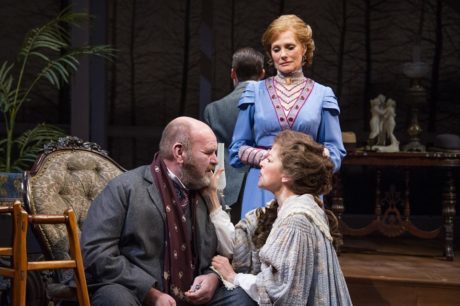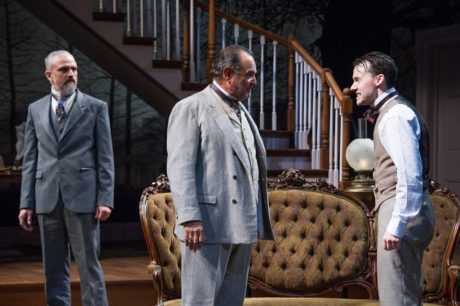The enduring popularity of Lillian Hellman’s The Little Foxes offers proof positive that themes of greed, racism, and misogyny continue to resonate with contemporary audiences. Though set in a small Alabama town at the turn of the 20th century, as the South struggled to modernize its economy, the Hubbard family’s tragic tale echoes many of the issues Americans grapple with today.

The Arena Stage’s handsome new production of Hellman’s play comes at a particularly salient time in our national dialogue, as emphasized by Kyle Donnelly in her Director’s Notes. “With the volatile political situation in this country right now and the continuing rise of the wealthy 1% to the detriment of the rest of the 99% of the population,” she writes, “The Little Foxes demonstrates the 19th- century roots of this kind of behavior in America.”
The action revolves around the Hubbard brothers’ plan to partner with a Chicago industrialist to build a mill amid the area’s cotton fields. Here, the brothers promise that wages will be kept low and workers will be ‘safely’ removed from union agitation. Though they have grown wealthy from their dry-goods business, often by cheating African-Americans and poor white citizens, Oscar and Benjamin Hubbard need additional funding from their sister Regina’s ailing husband Horace Glidden. Their struggle to complete the financing reveals and exacerbates ugly fissures within the family.
Marg Helgenberger plays Regina Giddens, a role originated by the legendary Tallulah Bankhead in 1939 and reprised by Bette Davis in the much-admired 1941 film. With her confident posture and strong yet honeyed voice, Helgenberger deftly displays Regina’s ambition and sharp wit. A woman frustrated by her marriage and the laws of inheritance which favored her brothers, Regina dreams of using her future profits from the mill to escape to Chicago.
Isabel Keating inhabits the role of Regina’s sister-in-law Birdie with affecting charm. Fully aware that Oscar married her with the sole intent of gaining possession of Birdie’s valuable plantation land, she turns to drink and nostalgia for the ‘gentility’ of the Old South.
Regina’s despicable brothers, Oscar and Benjamin, personify the greed that drives Hellman’s plot. The esteemed Edward Gero is outstanding as the bachelor brother Benjamin Hubbard. His swagger enlivens the entire production and his ability to get the better of his sister electrifies the stage during the final, pivotal scene.
Gregory Linington, as Oscar, turns his peevish insecurity into pure nastiness, killing animals for sport, mindless of the sustenance that they could provide for the local poor, and into abuse of Birdie.
As Horace Giddens, Jack Willis does an excellent job of conveying the tragedy of a strong and principled man imprisoned in a failing body. We watch his face tighten and fall as Regina cruelly berates him and makes a mockery of their marriage.

Megan Graves as Regina’s daughter Alexandra and Stanton Nash as Oscar’s son Leo provide glimpses into the lives and aspirations of the upcoming generation. Alexandra emerges from her decayed family determined to go her own way. Her thieving cousin Leo casts his lot with his father and uncle, forever to be bullied by them. Kim James Bey (Addie), and David Emerson Toney’s Cal, the Gliddens’ faithful, long-serving African-American servants, remind us that the Old South’s social order remained largely intact through the turn of the century. James Whalen, as the dashing Chicago industrialist William Marshall, has a brief but important role as the focus of the Hubbards’ aspirations.
After the first act, where, at times, actors spoke past rather than to one another, the cast really gelled as an ensemble. Particularly affecting was the opening scene of Act III, where Addie, Birdie, Alexandra, and Horace – easily the play’s most likable characters — enjoyed a rare moment of camaraderie and warmth as they conversed over Addie’s cakes and elderberry wine.
“It’s nice here,” says Alexandra. “Just us. Be nice if it could always be this way.” But of course, it couldn’t. Soon enough, Horace’s attention was focused on his discovery of a massive deception, and Birdie’s nostalgia turns to self-loathing as she imbibes too much wine. The end of this scene was a sad contrast to the sweetness with which it had started.
Set Designer Mikiko Suzuki Macadams has created a magnificent environment on stage. Her heavy Victorian interior, sheathed in subtle browns and grays, is punctuated with a steep central staircase that becomes essential to the action. Interestingly, there is no real back wall to the house. Instead we have a luminous scrim with bare trees beyond it. During the last act, as the scrim is lightened, we glimpse what look like crude slave cabins just a short distance from the main house. What better reminder could we have of the recency of slavery, and the poverty that surrounds the Glidden’s home.
The gothic, ominous feel of the production is further heightened by Ryan Rumery’s original composition and sound design. Organ music, sometimes dissonant, punctuates the play. And occasionally, one hears a single note, subtle but sustained, serving as a sonic bridge between actions. The sound ‘registers’ with playgoers, but never dominates.

Jess Goldstein’s sumptuous costumes add to the play’s visual texture, especially as they served to enhance the female characters. The splendid, sexy, red velvet dress that Regina wears in the first act slices through her expensive but drab surroundings. It is a vivid metaphor for her social aspirations. By contrast, Birdie’s pale pastel gowns, adorned with flowers, echo the faded elegance of her lost youth.
Filled with exceptional performances, The Little Foxes is the first of the Arena’s Lillian Hellman Festival in honoring not only the playwright, but also the theater’s late co-founder Zelda Fichandler. It is also a fitting follow-up to last year’s city-wide Women’s Voices Theater Festival. The Little Foxes reminds us Hellman’s piercing intelligence and her contributions that to the American stage. Later this season, we’ll delve further into her work with the Arena’s upcoming Watch on the Rhine.
Running Time: Two hours and 40 minutes, with two intermissions.
The Little Foxes plays through October 30, 2016 at Arena Stage, 1101 Sixth St. SW, in Washington, DC. For tickets, call (202) 488-3300, or purchase them online.
RATING:




